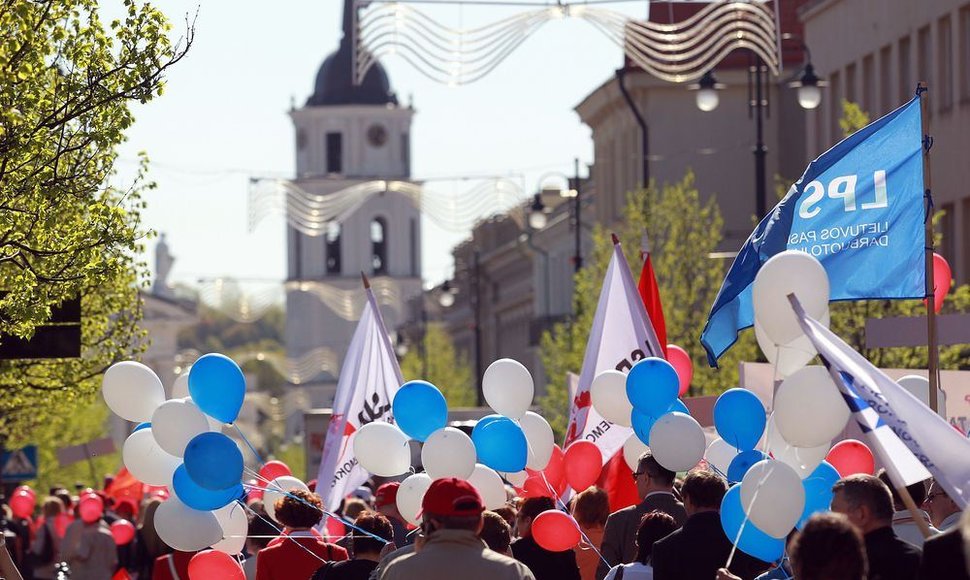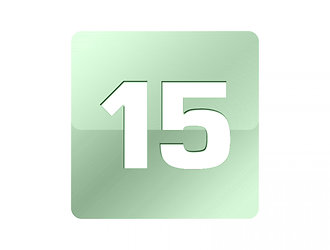This year, many working people decided to take an extra day off on Monday and have a short vacation abroad or in the country.
Preparations for elections
It is the Lithuanian Social Democrats who are traditionally most keen on commemorating the 1 May, which is also an anniversary of the party's founding. This year, it turns 116.
The Social Democrats start the celebration early in the morning with a procession along Gediminas Avenue in Vilnius, marching with the Lithuanian Labour Union Confederation from the Parliament building to the Government. According to their press release, the demonstration is intended to promote decent work and fair pay as well as to draw attention to stopping emigration.
Later that day, the party holds a general meeting where it is to vote on its election platform and candidate list. The event is crowned by a concert at the White Bridge at 5 PM.
Another political party has also decided to use the occasion for a demonstration – the Socialist People's Front, led by controversial ex-MP Algirdas Paleckis.
Anti-capitalist rally under Cvirka monument
Another movement – Occupy Vilnius – is holding a general assembly near Petras Cvirka monument (corner at Pylimo street and Pamėnkalnio street). According to the movement's spokespeople, in Lithuania, the 1 May – the day that celebrates international workers' solidarity – usually amounts to nothing more than “colourful parades held by political parties and prostitute labour unions.” Occupy Vilnius is therefore urging people to turn the 1 May into “a day of solidarity, joint strategy-making, and the start of communal struggle.”
The event is intended to draw attention to “capitalism-triggered mass emigration, unemployment, the rightlessness of working people, unbearable debts, sky-rocketing prices of the essentials and taxes, the passivity of the working class.” The organizers use the term “working people” to refer not only to employed workers, but also to the unemployed, to housewives, students, homeless people and everyone else “exploited by capital.”
Bloody demonstrations
The origins of the International Labour Day go back to 1886, when hundreds of thousands of people went to the streets of Chicago to support workers at one plant, who were prohibited to form a union. People demanded to curb working day to 8 hours. After several days of protesting, the police suppressed the rally, there were casualties. On the following day, protesters threw a bomb at police officers, who opened fire at the crowd. Eight protesters were arrested and sentenced to death (only three of them were later pardoned).
The events that started on 1 May in Chicago had international repercussions. Three years later, members of the Second International congress in Paris declared the 1 May a day of world proletariat solidarity. Workers around the globe were invited to hold one-day protests every year in order to call for reforms and show the force of the working class. The following year, 1 May events were held in several countries.
Lithuania legally established the holiday soon after gaining independence in 1918, but it was revoked in 1930. After that, the 1 May was only celebrated by the communist party. The holiday made its return with the Soviet regime and still has a “red” flavour in the Lithuanian collective memory, while many people feel sceptical about it after the Independence. Currently, the International Labour Day is a bank holiday in Lithuania, intended to commemorate workers' struggle for their rights and bring attention to their situation, working conditions, and health-care as well as unemployment.
Back in the day, the Russian Empire – that Lithuania was also a part of – started celebrating the 1 May in 1890. It soon acquired political undertones and was often accompanied by mass protests. It was declared an official state holiday after the October Revolution (1917) and was celebrated with marches and military parades. Eventually, it came to symbolize Soviet support for workers' revolutionary struggle in capitalist countries, for national liberation movements, struggle for peace. There is a video on YouTube, showing a 1960 demonstration and people carrying huge banners with the word “peace” written in various languages.
In the Soviet times, participation in 1 May demonstrations was compulsory, even though many people tried to evade the duty. Some participated genuinely believing in slogans they were chanting, others simply to avoid trouble. According to Vidmantas from Vilnius, if one ignores the fact that people were forced to demonstrate and the message of workers' rights was overshadowed by Soviet propaganda, it wasn't such a nuisance to march on main streets under springtime sun, especially if one compared it to October celebrations. Many would spend the rest of the day chilling with their colleagues, families, and friends.
Organized columns of demonstrators would march on main streets in every town and village, resonant with marches and political songs. People would carry banners and portraits of Lenin, wave flags and flowers. Communist Party leaders and state officials, as well as war veterans and worthy workers, would greet the crowds from tribunes erected outside major state institutions. The most important demonstration was held in the Red Square in Moscow (complemented by a military parade until 1968), broadcast live in all Soviet Republics. The last demonstration of this sort was held in 1990, in the capital city of the already crumbling Soviet Union.
People generally liked the 1 May holiday – not so much out of solidarity with the world proletariat as for a day off they could use to plant potatoes. The same could be said about the 9 May, when the Soviet Union would go all-out celebrating the Victory Day (against Nazi Germany). People would also have so-called mayovki (from the Russian word for May) – picnics with families and relatives.
Celebrating spring
Today, almost 150 countries and territories celebrate the International Labour Day on 1 May or the first Monday of May. Some countries mark it on other dates.
In the UK, the 1 May has been a bank holiday since 1977, when the country had a Labour government. That same year, Israel's Labour Party lost elections and the day lost its official status, even though some towns continued to hold demonstrations. South Africans organize exhibitions of folk art and luxury-sales.
In other countries, the day coincides with other celebrations. Hawaiians, for instance, hold a dance festival, Finns – student carnival, Spain celebrates its festival of colours, while Sicilians pick wild flowers that are believed to bring luck.
Various early-May celebrations are much older than the workers' solidarity movement. 3 thousand years ago, Romans would give offerings to Maia, goddess of earth and fertility. It was she that lent her name to the last month of spring. In pre-Christian Europe, people used to celebrate the beginning of sowing time, worshipping gods of Sun and harvest. Between April and May, Germanic nations would celebrate Walpurgisnacht – an annual gathering of all witches.




















